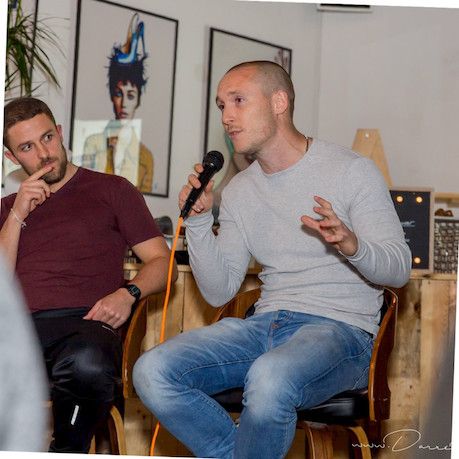The third session of our virtual event on COVID-19 and how the events industry is responding was 'Keeping Your Remote Team Motivated, Healthy And Productive During Uncertain Times'.
Discussing this was Louise Ware, Head of People, FYXER and Mark Maher, Sales and Marketing Director, Boulevard Events & Chairman, EventWell, with Jennifer Jenkins, Director at Worldspan, moderating the panel.
You can watch the video below, or read on for our key takeaways of the session.
Table of Contents
1. Communication is key
2. Same ingredients, different recipe
3. Ask, don't assume
4. Q&A
5. The Speakers
Key Takeaways
Communication is key
Louise tells us that the team at FYXER rely on tools such as Slack instead of emailing each other, allowing group communication in an organised, structured way. For example, having lots of different channels, from work-based channels to social channels (just like a virtual water cooler), allows team members to achieve the social engagement that they’d have in the office. It’s really important to maintain social interaction in your work day.
A great feature of Slack is that it doesn't need moderating, it's easy to set up all kinds of channels that will give people the chance to socialise and a bit of a break! She stresses that it's also important to not push social interaction onto people, it needs to be optional.

Same ingredients, different recipe
Mark says that at our very core, one of the key things we need to achieve happiness is to contribute. The key to our happiness relies on the same things, but it is the mediums by which you achieve that happiness that changes. At an individual level, we all have a responsibility to ourselves to care for our happiness and wellbeing by keeping ourselves motivated, doing so with a purpose or an agenda.
Even furloughed employees require purpose and direction, so employers should consider ways they can do this. Whether this be through additional training opportunities or taking part in team social activities, furloughed employees need to feel that they're still contributing to the team in some way.

Ask, don't assume
Louise highlights that we should never assume what people want. She recommends doing polls, on Slack or whatever tool you have available, asking how they as an employer can support you. For example, if you have parents on your team, it's key to ask how an employer can support them, and recognise that different team members may have very different home situations. Louise stresses the importance that employers should never assume what will help people, just ask what they need instead.

Q&A
How can event organisers keep motivated when everything they've been working on is cancelled?
Mark answers this by stating that by and large, we're all in the same boat, and that everyone's world has been turned upside down. Replacing things we would usually be working on with new and exciting tasks, such as learning a new language, can help retain motivation. He adds that we shouldn't get lazy just because we don't need to travel further than our living rooms, there's no movement necessary in our day and we don't need to socialise with other humans. He says we have to go and seek those things out and try a little harder to get those things, as they are actually really important.
How can you give staff honest reassurance about redundancies, when you yourself are not sure what will happen in three months time?
Louise's message is clear: don't give reassurance. We don't have the facts so don't reassure! Everyone knows this is a difficult time, so we need to stay as open, genuine and transparent as possible. It's also important to protect people, they don't need to know if there's a massive risk. Mark adds that 'you don't know what you don't know'. Employers shouldn't feel unnecessary pressure to have all the answers: the word of the moment is 'unprecedented' for a reason! Don't overpromise, but communicate openly and honestly.
Do you think it is too soon to proactively source business for Q3 / Q4?
Mark notes that it’s never too soon to be thinking about the longevity of your business and if immediate operations are slow, it’s a perfect time to be thinking about the future. This is a time to be considerate about the sales approach you take. People are thinking about survival and about helping others more than ever, so they are less interested in being sold to, particularly if the product is non-essential.
His advice would be to put your branding hat on and be less transactional about things. Think less about the specific targets you want to hit in Q3-4 and more about adding value to your clients/potential clients in an uncertain time. Louise agrees that it's never too soon! It's time to reflect on the value of your offering and talk to clients about their needs.
What balance should a director strike between staying in touch with furloughed employees, without it being perceived as "work"?
Mark suggests to not ask them about work, ask them about themselves. There is absolutely nothing stopping you from checking in with your employees and having a conversation about their wellbeing, how they are getting on at home, what Netflix shows they’re watching or if their families are ok. Maintaining the social connection is vital and when our teams come back to work, the ones who still feel connected will pick up where they left off far quicker.
Louise adds that FYXER has a weekly newsletter, which includes a mix of work and personal updates, shared with all employees, including furloughed employees. It gives an opportunity for people to see what's happening in the workplace and be part of updates from the people side too. Aside from this, the HR manager could check in with furloughed employees every few weeks.
The Speakers
Louise Ware, Head of People, FYXER
Louise Ware has been managing people and projects for the past 15+ years. She has experience in financial services, oil, startups and the public sector. She has worked 100% remotely, flexibly through to 100% office based with no flexibility. Louise is an advocate for remote work, and believes it gives people the freedom to work where’s best for them. She is currently Head of People at FYXER: a virtual assistant service giving clients the freedom to focus on what matters.

Mark Maher, Sales and Marketing Director, Boulevard Events & Chairman, EventWell
After graduating with a Masters in Sport and Exercise Science and publishing his dissertation in one of the world’s leading science journals, Mark joined his family at Boulevard Events, an independently owned event catering company. He has worked in events and hospitality for the past decade, giving him a broad understanding of the many challenges we face in this industry. His success as a sports scientist and passion for health and human performance gives Mark a unique perspective, within an industry that’s notoriously challenging to navigate. He has been helping event professionals make health and wellbeing a bigger part of their life for many years and is now the Chairman of Eventwell, the mental health and wellbeing voice for the event industry.

We hope you enjoyed reading the key points from the third session of our virtual event. You can also read the key takeaways from the first and second sessions here. We will be releasing a write-up on the other sessions in the coming days, so keep your eyes peeled!
If you're interested in holding a virtual event of your own, please fill out this enquiry form with your brief and we will get back to you to turn your vision into a reality.
We've also created a platform to keep you up-to-date with all the latest Coronavirus news, as well as the latest useful industry responses to the ongoing pandemic.




